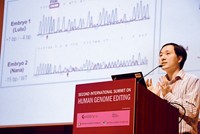Advertisement
Grab your lab coat. Let's get started
Welcome!
Welcome!
Create an account below to get 6 C&EN articles per month, receive newsletters and more - all free.
It seems this is your first time logging in online. Please enter the following information to continue.
As an ACS member you automatically get access to this site. All we need is few more details to create your reading experience.
Not you? Sign in with a different account.
Not you? Sign in with a different account.
ERROR 1
ERROR 1
ERROR 2
ERROR 2
ERROR 2
ERROR 2
ERROR 2
Password and Confirm password must match.
If you have an ACS member number, please enter it here so we can link this account to your membership. (optional)
ERROR 2
ACS values your privacy. By submitting your information, you are gaining access to C&EN and subscribing to our weekly newsletter. We use the information you provide to make your reading experience better, and we will never sell your data to third party members.
Biotechnology
Scientist behind birth of gene-edited babies will be punished, Chinese investigators say
Report says He Jiankui sought fame and fortune when creating CRISPR-edited human embryos
by Ryan Cross
January 22, 2019
| A version of this story appeared in
Volume 97, Issue 4

He Jiankui, the scientist responsible for the birth of the first genetically-engineered human babies, will face punishment, according to C&EN’s translation of a report from China’s state media agency, Xinhua.
In late November, He shocked the world when MIT Technology Review revealed the birth of the twin girls whose genes were edited with CRISPR-Cas9 when they were embryos. The project was conducted secretly and without ethical oversight. He’s goal was to introduce a mutation that could make the twin girls—whom he calls Lulu and Nana—resistant to HIV infection.
The Guangdong Province Investigation Task Force said that He severely breached ethical and moral principles, according to the Xinhua report. The investigators determined that He funded the project himself, intentionally evaded regulations, and conducted the experiment to seek fame and financial gain.
Following the Xinhua report, the Southern University of Science and Technology immediately fired He, where he was an associate professor. He had been on unpaid leave from the university since February 2018.
The Guangdong investigators determined that He began building a team for the experiment in June 2016. In March 2017, He forged a document suggesting that the study was approved by an ethics board. And through November 2018, He and his team recruited eight couples to participate in the study where embryos created in the lab were edited with CRISPR and then implanted via in vitro fertilization, the Xinhua report says.
All the female participants were HIV negative and all the males were HIV positive. Because HIV carriers are prohibited from seeking assisted reproduction in China, He arranged for other people to undergo blood tests instead of the study participants. One couple dropped out of the study, and five didn’t conceive after the gene-edited embryos were implanted. One couple had twin girls that were born last year. Another couple is expecting, meaning a third gene-edited baby could be born this year.
In a document signed in March 2017, He says his work will surpass the importance of the 2010 Nobel Prize in Physiology or Medicine, which was awarded for the development of in vitro fertilization. In that document, posted on the Chinese Clinical Trial Registry, He also says his gene editing experiment will be the beginning of a new era for treating countless hereditary diseases.
Advertisement
Although some scientists support the future use of embryo editing to treat certain severe diseases, scientists, ethicists, and clinicians were nearly unanimous in their critique of He’s work, saying it lacked scientific merit. There are easier, safer ways to prevent HIV infection, and analyses of He’s preliminary results suggest the editing didn’t work as well as intended.
The Guangdong investigators said that He violated regulations prohibiting human embryo editing for reproductive purposes, and that He and others involved in his work will be “seriously dealt with in accordance with relevant laws and regulations,” the Xinhua report says. The Guangdong province will also follow the two babies and the pregnant volunteer.



Join the conversation
Contact the reporter
Submit a Letter to the Editor for publication
Engage with us on Twitter